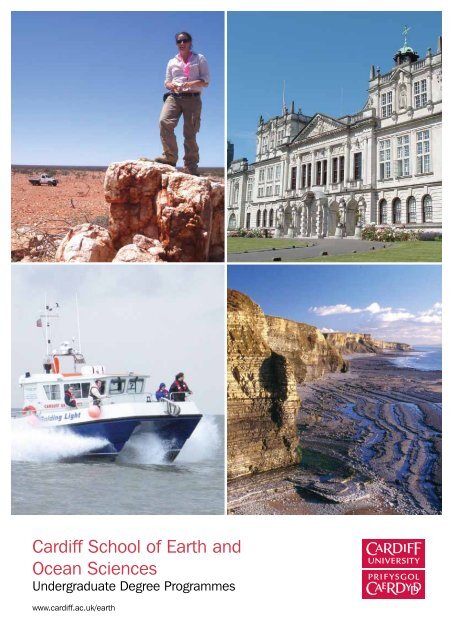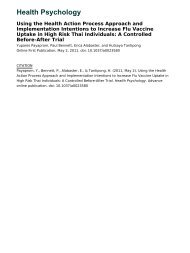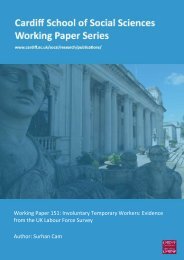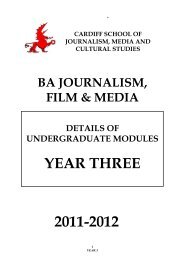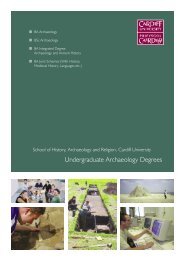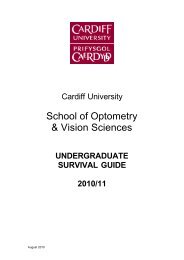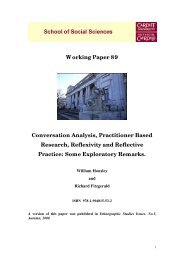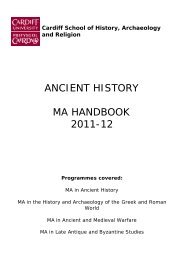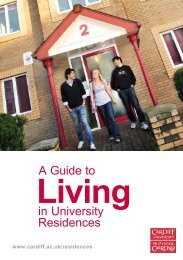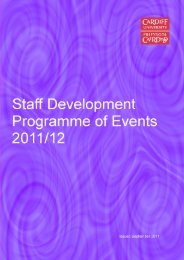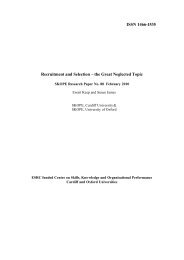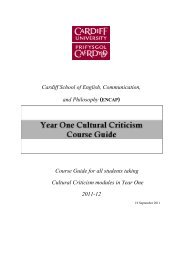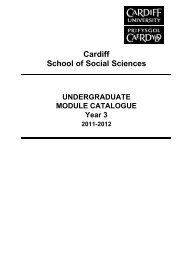Cardiff School of Earth and Ocean Sciences - Cardiff University
Cardiff School of Earth and Ocean Sciences - Cardiff University
Cardiff School of Earth and Ocean Sciences - Cardiff University
Create successful ePaper yourself
Turn your PDF publications into a flip-book with our unique Google optimized e-Paper software.
<strong>Cardiff</strong> <strong>School</strong> <strong>of</strong> <strong>Earth</strong> <strong>and</strong><br />
<strong>Ocean</strong> <strong>Sciences</strong><br />
Undergraduate Degree Programmes<br />
www.cardiff.ac.uk/earth
Why Study<br />
<strong>Earth</strong> <strong>Sciences</strong>?<br />
You have opened the first page <strong>of</strong> our<br />
brochure so you’re obviously curious about<br />
the possibility <strong>of</strong> studying <strong>Earth</strong> <strong>Sciences</strong><br />
at <strong>University</strong>. You’ve probably not studied<br />
<strong>Earth</strong> <strong>Sciences</strong> much in school although<br />
you may have touched on some aspects<br />
in Geography. <strong>Earth</strong> <strong>Sciences</strong> is, like<br />
medicine, very broad-based <strong>and</strong> includes<br />
some <strong>of</strong> the most exciting topics <strong>and</strong><br />
relevant issues in science <strong>and</strong> society<br />
today.<br />
What has interested you about<br />
<strong>Earth</strong> <strong>Sciences</strong>?<br />
Is it the destructive forces <strong>of</strong> volcanoes,<br />
earthquakes or tsunamis? Or questions<br />
like why were the dinosaurs wiped out?<br />
Was it really due to a meteorite impact,<br />
or were massive volcanic eruptions the<br />
cause?<br />
You may wonder why our climate is<br />
changing <strong>and</strong> sea level rising. Will global<br />
warming result in a situation where the<br />
UK could become like the Mediterranean?<br />
Or perhaps this is merely a climatic blip,<br />
<strong>and</strong> we are going to undergo another Ice<br />
Age, where much <strong>of</strong> the UK will be buried<br />
beneath a kilometre <strong>of</strong> ice.<br />
You may be interested in how gold <strong>and</strong><br />
diamonds form, or how we use modern<br />
technology to explore for the natural<br />
resources like oil <strong>and</strong> gas deep in the<br />
<strong>Earth</strong>’s crust.<br />
Perhaps you are interested in<br />
environmental issues like the pollution<br />
<strong>of</strong> drinking water, waste management<br />
or ecology <strong>and</strong> conservation. You may<br />
like the idea <strong>of</strong> preserving our green<br />
field areas by cleaning up old industrially<br />
contaminated sites for re-use for housing<br />
or recreation.<br />
You may be interested in the marine<br />
environment. The name <strong>of</strong> the planet<br />
is actually a misnomer, it shouldn’t be<br />
called <strong>Earth</strong> as it’s two thirds covered<br />
by water. The deep oceans are less well<br />
mapped than Venus <strong>and</strong> still constitute<br />
a major exploration frontier. A thorough<br />
underst<strong>and</strong>ing <strong>of</strong> Marine Science is vitally<br />
important, as the oceans play a crucial<br />
role in controlling our climate. Marine<br />
scientists look back into the past history<br />
<strong>of</strong> our planet by investigating ancient
1<br />
ocean sediments: this is how we get most<br />
<strong>of</strong> our information about how the <strong>Earth</strong><br />
system has behaved in the past.<br />
Why is the <strong>Earth</strong> like it is? The planet<br />
could have evolved like Venus – with<br />
an inferno-like surface – or Mars, as an<br />
arid, cold, virtual vacuum for its surface<br />
environment. Can we underst<strong>and</strong> more<br />
about the <strong>Earth</strong> by studying what went<br />
wrong on other planets in the solar<br />
system? How did life start? Did life<br />
actually start on <strong>Earth</strong>, or did life arrive<br />
here from other planets?<br />
All this, <strong>and</strong> more, constitutes <strong>Earth</strong><br />
Science. At <strong>Cardiff</strong>, we are currently<br />
<strong>of</strong>fering 19 different undergraduate degree<br />
programmes in the <strong>Earth</strong> <strong>Sciences</strong>,<br />
including our new four-year MESci degree<br />
with a year <strong>of</strong> international study. We<br />
can cover more <strong>of</strong> the subject than most<br />
universities because we are one <strong>of</strong> the<br />
largest <strong>Earth</strong> Science <strong>School</strong>s’ in the<br />
UK <strong>and</strong> we have world experts in many<br />
disciplines. This means as a student you<br />
have a great opportunity to be taught by<br />
internationally renowned experts while<br />
following your own particular interests <strong>and</strong><br />
ambitions.<br />
We believe you should study what interests<br />
<strong>and</strong> excites you. If you do this you’ll get<br />
a better degree <strong>and</strong> a good job. As you<br />
read this brochure you may well not know<br />
enough about <strong>Earth</strong> <strong>Sciences</strong> to make<br />
a decision about which degree subject<br />
to choose. At <strong>Cardiff</strong> we realise this. Our<br />
largely common first year is geared to<br />
teaching you as much as possible about<br />
the various aspects <strong>of</strong> <strong>Earth</strong> Science. Only<br />
later in Year 1 do you choose which actual<br />
degree course to follow for the next two or<br />
three years.<br />
There are many <strong>Earth</strong> Science courses to<br />
choose from in the UK. Some Universities<br />
provide programmes that are a bit<br />
different, such as our Marine Geography<br />
<strong>and</strong> Exploration <strong>and</strong> Resource Geology<br />
degrees. Your choice <strong>of</strong> <strong>University</strong> in the<br />
UK will mainly depend on how much you<br />
feel that the local environment suits you.<br />
Come <strong>and</strong> visit us on an open day <strong>and</strong> see<br />
for yourself what <strong>Cardiff</strong> can <strong>of</strong>fer you as a<br />
place to live <strong>and</strong> study in. You’ll find that<br />
the more you learn about <strong>Earth</strong> <strong>Sciences</strong><br />
at <strong>Cardiff</strong>, the more exciting it becomes.
2<br />
Contents<br />
Students from the <strong>School</strong> <strong>of</strong> <strong>Earth</strong> <strong>and</strong> <strong>Ocean</strong> <strong>Sciences</strong> celebrating their graduation<br />
The City 4<br />
The <strong>University</strong> 6<br />
Accommodation 8<br />
Student Life 9<br />
Degree Courses 10<br />
The First Year 12<br />
Master in <strong>Earth</strong> Science 13<br />
MESci (International) 16<br />
Marine Geoscience 17<br />
Geology 19<br />
Exploration <strong>and</strong> Resource Geology 21<br />
Environmental Geoscience 23<br />
Marine Geography 25<br />
<strong>Earth</strong> <strong>Sciences</strong> with a Preliminary Year 28<br />
Career Prospects 28<br />
Postgraduate Masters Courses 29<br />
Research in <strong>Cardiff</strong> 30<br />
Admissions 32<br />
Important information. Please read carefully.<br />
The <strong>University</strong> <strong>of</strong>fers the information contained in this brochure<br />
as a guide only. It does not constitute a contract <strong>and</strong> is not<br />
binding on prospective students, students or the <strong>University</strong>.<br />
While the <strong>University</strong> makes every effort to check the accuracy<br />
<strong>of</strong> the factual content at the time <strong>of</strong> publication, some<br />
changes will inevitably occur in the interval between<br />
publication <strong>and</strong> the academic year to which the brochure<br />
relates (Entry 2010). For example, degree programmes may<br />
have changed in line with market <strong>and</strong> student dem<strong>and</strong>, <strong>and</strong><br />
research development. Applicants should not therefore rely<br />
solely on this brochure <strong>and</strong> should visit the Law <strong>School</strong><br />
website (www.law.cardiff.ac.uk) for up-to-date information<br />
concerning course content, accreditation, <strong>and</strong> entry<br />
requirements for the relevant academic year when considering<br />
applying to the <strong>University</strong>.<br />
Terms <strong>and</strong> Conditions<br />
Every effort has been made to ensure that the information<br />
contained within this brochure is correct at the time <strong>of</strong> going to<br />
press in June 2009. However, the <strong>University</strong> does not accept any<br />
liability for any errors that it may contain, or for any subsequent<br />
changes to the <strong>University</strong> or Government policy that may affect<br />
the information given. <strong>Cardiff</strong> <strong>University</strong> expressly excludes any<br />
representations or warranties (whether expressed or implied)<br />
<strong>and</strong> all liability including direct, indirect, special, incidental or<br />
consequential damages arising out <strong>of</strong> the use <strong>of</strong> the information<br />
on these pages, to the fullest extent possible under law.<br />
3000EARTH0610
3<br />
The <strong>University</strong> is located in <strong>and</strong> around the magnificent civic centre<br />
Welcome<br />
Studying for a degree is a major investment for<br />
your future <strong>and</strong> choosing your university <strong>and</strong><br />
degree programme is one <strong>of</strong> life’s all-important<br />
decisions. I hope that you will find this brochure<br />
helpful <strong>and</strong> informative as you consider the<br />
options open to you as a potential university<br />
student. It contains information about the<br />
city <strong>of</strong> <strong>Cardiff</strong> <strong>and</strong> the <strong>University</strong>, the practical<br />
<strong>and</strong> study facilities in the <strong>School</strong> <strong>of</strong> <strong>Earth</strong> <strong>and</strong><br />
<strong>Ocean</strong> <strong>Sciences</strong> <strong>and</strong> the range <strong>of</strong> its degree<br />
programmes <strong>and</strong> component modules. It also<br />
describes some <strong>of</strong> the leisure, sporting <strong>and</strong><br />
cultural facilities in <strong>Cardiff</strong> <strong>and</strong> the surrounding<br />
area.<br />
As you will see as you delve further into this<br />
brochure, <strong>Earth</strong> <strong>Sciences</strong> is very relevant to many<br />
current global issues facing humankind, ranging<br />
from climate change to exploration for natural<br />
resources. If you would like to receive further<br />
information about the <strong>School</strong>, or would like to<br />
arrange a visit, please do not hesitate to get in<br />
contact. Our telephone <strong>and</strong> fax numbers, <strong>and</strong><br />
email addresses are given inside the back page.<br />
Pr<strong>of</strong>essor R John Parkes<br />
Head <strong>of</strong> <strong>Cardiff</strong> <strong>School</strong> <strong>of</strong> <strong>Earth</strong> <strong>and</strong><br />
<strong>Ocean</strong> <strong>Sciences</strong><br />
The <strong>School</strong> has an international reputation<br />
for all its activities <strong>and</strong> our staff have a wide<br />
range <strong>of</strong> expertise that is reflected in our<br />
broad curriculum. It <strong>of</strong>fers a rich <strong>and</strong> rewarding<br />
student experience <strong>and</strong> provides a friendly <strong>and</strong><br />
stimulating environment in which you should be<br />
able to fulfil your full potential in your studies.<br />
Teaching at all levels is informed by research that<br />
lies at the very cutting edge <strong>of</strong> the subject area.<br />
Outdoor teaching at Lulworth Cove, Dorset
4<br />
main photo<br />
<strong>Cardiff</strong> Castle <strong>and</strong><br />
the Millennium Stadium<br />
below left<br />
The New Theatre<br />
below middle<br />
<strong>Cardiff</strong> Bay<br />
below right<br />
<strong>Cardiff</strong> Civic Centre
5<br />
<strong>Cardiff</strong> is one <strong>of</strong> Europe’s youngest capital<br />
cities. Compact, green, friendly <strong>and</strong> full <strong>of</strong> life,<br />
it provides a first-class environment in which to<br />
live <strong>and</strong> study.<br />
As the capital city <strong>of</strong> Wales, <strong>Cardiff</strong> has an<br />
impressive range <strong>of</strong> leisure, sporting <strong>and</strong><br />
cultural amenities. Many <strong>of</strong> the facilities are<br />
<strong>of</strong> international st<strong>and</strong>ard. The city boasts<br />
world-class concert venues in the International<br />
Arena <strong>and</strong> St David’s Hall, <strong>and</strong> is the focus <strong>of</strong><br />
national <strong>and</strong> international sports events at the<br />
Millennium Stadium.<br />
Culturally, <strong>Cardiff</strong> is well catered for, with the<br />
National Museum <strong>and</strong> Gallery <strong>of</strong> Wales, several<br />
theatres <strong>and</strong> the historic <strong>Cardiff</strong> Castle. The city<br />
also boasts a vibrant shopping centre, numerous<br />
cinemas <strong>and</strong> restaurants, great pubs <strong>and</strong> music<br />
venues. The development <strong>of</strong> <strong>Cardiff</strong> Bay is a<br />
major attraction <strong>and</strong> is home to the Welsh<br />
Assembly <strong>and</strong> the Wales Millennium Centre.<br />
<strong>Cardiff</strong> is a compact city with large areas <strong>of</strong> parkl<strong>and</strong> <strong>and</strong><br />
good local transport. Furthermore, unlike many other<br />
cities, it <strong>of</strong>fers easy access to the countryside, coast<br />
<strong>and</strong> mountains. The Brecon Beacons National Park is<br />
only a 30-minute drive from <strong>Cardiff</strong> <strong>and</strong> the Glamorgan<br />
Heritage Coast is within easy reach. The city is also easily<br />
reached by road or rail from other parts <strong>of</strong> Britain.<br />
<strong>Cardiff</strong> International Airport, just outside<br />
the city, has frequent connections to<br />
Europe <strong>and</strong> destinations outside<br />
the EU.<br />
<strong>Cardiff</strong> combines the practical<br />
advantages <strong>of</strong> a small, friendly, city<br />
with the cultural <strong>and</strong> recreational<br />
amenities <strong>of</strong> a successful <strong>and</strong><br />
modern capital. Such is<br />
the quality <strong>of</strong> the ‘<strong>Cardiff</strong><br />
experience’ that in<br />
a recent survey a<br />
large majority <strong>of</strong><br />
the students said<br />
they would like to<br />
stay <strong>and</strong> live in<br />
the city after<br />
graduation.<br />
<strong>Cardiff</strong> - the City<br />
Don’t just take our word for it . . .<br />
“<strong>Cardiff</strong> is the epitome <strong>of</strong> cool, pulsing<br />
with a creative energy <strong>and</strong> relaxed<br />
atmosphere that complements its<br />
youthful heritage.”<br />
The Lonely Planet<br />
“<strong>Cardiff</strong> is popular with students <strong>of</strong>fering<br />
all the attractions <strong>of</strong> a large conurbation<br />
without such high prices as students<br />
experience elsewhere.”<br />
The Times Good <strong>University</strong> Guide<br />
More online at:<br />
www.visitcardiff.com<br />
www.cardiff.ac.uk<br />
www.cardiff.co.uk<br />
“<strong>Cardiff</strong> is one <strong>of</strong> the best places to<br />
study in Britain.It has well situated,<br />
cheap housing, lively nights out, friendly<br />
people, great shops <strong>and</strong> hundreds <strong>of</strong><br />
miles <strong>of</strong> countryside. It is all that any<br />
right-thinking fresher could desire.”<br />
Virgin Alternative Guide to British<br />
Universities<br />
Come <strong>and</strong> see for yourself . . .<br />
<strong>Cardiff</strong> benefits from excellent road <strong>and</strong> rail<br />
links with Britain’s other major towns <strong>and</strong><br />
cities. London, for example, is two hours by<br />
train, <strong>and</strong> the M4 links both the west <strong>and</strong><br />
south <strong>of</strong> Engl<strong>and</strong>, as well as west Wales.<br />
Travel to the Midl<strong>and</strong>s <strong>and</strong> the North is<br />
equally convenient. The journey by road from<br />
Birmingham, for example, takes only two hours.<br />
The main coach <strong>and</strong> railway stations are both<br />
centrally placed <strong>and</strong> <strong>Cardiff</strong> also benefits from<br />
an international airport.
6<br />
<strong>Cardiff</strong> - the <strong>University</strong><br />
Students have access to the latest<br />
information technology<br />
Main picture:<br />
The <strong>University</strong>’s Main Building,<br />
home to <strong>Cardiff</strong> <strong>School</strong> <strong>of</strong><br />
<strong>Earth</strong> <strong>and</strong> <strong>Ocean</strong> <strong>Sciences</strong><br />
<strong>Cardiff</strong> <strong>University</strong> is recognised in independent<br />
government assessments as one <strong>of</strong> Britain’s<br />
leading teaching <strong>and</strong> research universities.<br />
Founded by Royal Charter in 1883, the<br />
<strong>University</strong> today combines impressive modern<br />
facilities <strong>and</strong> a dynamic approach to teaching<br />
<strong>and</strong> research with its proud heritage <strong>of</strong> service<br />
<strong>and</strong> achievement. The <strong>University</strong>’s breadth<br />
<strong>of</strong> expertise encompasses: the humanities;<br />
the natural, physical, health, life <strong>and</strong> social<br />
sciences; engineering <strong>and</strong> technology.<br />
The <strong>University</strong> has an outst<strong>and</strong>ing location<br />
amidst the parks, Portl<strong>and</strong> stone buildings <strong>and</strong><br />
tree-lined avenues that form the city’s elegant<br />
civic centre. Unusually for a civic university,<br />
most <strong>of</strong> the <strong>University</strong>’s student residential<br />
accommodation is within easy walking distance<br />
<strong>of</strong> lecture theatres, libraries <strong>and</strong> the Students’<br />
Union, saving you time <strong>and</strong> money. More than<br />
£200million has been invested in the <strong>University</strong><br />
estate in recent years to provide new <strong>and</strong><br />
refurbished facilities <strong>of</strong> the highest quality.<br />
<strong>Cardiff</strong> is a member <strong>of</strong> the Russell Group <strong>of</strong><br />
Britain’s leading research universities <strong>and</strong> was<br />
ranked 7th out <strong>of</strong> more than 100 UK universities<br />
in the latest independent assessment <strong>of</strong><br />
research. This creates a stimulating environment<br />
for teaching, ensuring that students are exposed<br />
to the very latest thinking <strong>and</strong> that the most<br />
modern technology <strong>and</strong> equipment is available.<br />
Teaching at <strong>Cardiff</strong> has been independently<br />
assessed as being <strong>of</strong> excellent st<strong>and</strong>ard.<br />
The Quality Assurance Agency for Higher<br />
Education, which undertakes assessments with<br />
all UK universities, confirmed that prospective<br />
students, parents, teachers <strong>and</strong> graduate<br />
employers can have every confidence in the<br />
quality <strong>and</strong> st<strong>and</strong>ards <strong>of</strong> <strong>Cardiff</strong>’s awards.
7<br />
Feedback in the recent National Student<br />
Surveys has also been very positive.<br />
The student population is drawn from a variety<br />
<strong>of</strong> backgrounds, with students attracted<br />
from throughout Wales, the rest <strong>of</strong> the UK<br />
<strong>and</strong> world-wide. The <strong>University</strong> currently<br />
has around 25,000 undergraduate <strong>and</strong><br />
postgraduate students <strong>and</strong> there is an almost<br />
equal balance between male <strong>and</strong> female<br />
students. International students comprise<br />
some 17% <strong>of</strong> the total student population.<br />
Government performance indicators show that<br />
students at <strong>Cardiff</strong> are more likely to succeed<br />
in their studies than students at most other<br />
UK universities. Currently, 95% <strong>of</strong> students<br />
successfully complete or transfer, better than<br />
many similar universities <strong>and</strong> better than the<br />
UK national average.<br />
“The <strong>University</strong> has an excellent reputation<br />
for the quality <strong>of</strong> its teaching <strong>and</strong> research.<br />
Almost 60% <strong>of</strong> its research is ranked<br />
as world leading <strong>and</strong> it is a member <strong>of</strong><br />
the Russell Group <strong>of</strong> leading research<br />
universities.”<br />
The Guardian <strong>University</strong> Guide<br />
“<strong>Cardiff</strong> is a tip top uni academically...<br />
hugely popular with its students. Is <strong>Cardiff</strong><br />
perhaps the best kept secret among<br />
Britain’s universities?”<br />
The Virgin Alternative Guide to<br />
British Universities<br />
“<strong>Cardiff</strong> has established itself as the front<br />
runner in Welsh higher education… it is<br />
a match for most rivals in teaching <strong>and</strong><br />
research <strong>and</strong> the overall performance is<br />
amongst the best in Britain.”<br />
The Times Good <strong>University</strong> Guide<br />
More online at:<br />
www.cardiff.ac.uk
8<br />
Accommodation<br />
Map key<br />
<strong>Cardiff</strong> <strong>School</strong> <strong>of</strong><br />
<strong>Earth</strong> <strong>and</strong> <strong>Ocean</strong><br />
<strong>Sciences</strong><br />
<strong>University</strong><br />
Buildings<br />
Accommodation<br />
Students Union<br />
Above<br />
<strong>University</strong> residences close to<br />
the <strong>School</strong><br />
<strong>Cardiff</strong> has always attached great importance<br />
to the provision <strong>of</strong> student accommodation <strong>and</strong><br />
has invested heavily in recent years to provide<br />
some <strong>of</strong> the highest quality residences in the UK<br />
university sector. Most <strong>of</strong> the accommodation<br />
is located close to the academic buildings. All<br />
first year undergraduates (who apply during the<br />
normal admissions cycle) are guaranteed a place<br />
in university accommodation. There is a choice <strong>of</strong><br />
catered or self-catered residences.<br />
New residences have been built in recent<br />
years <strong>and</strong> many <strong>of</strong> the older ones have been<br />
refurbished to a high st<strong>and</strong>ard. The majority <strong>of</strong><br />
the 5,100 study/bedrooms have individual shower<br />
<strong>and</strong> toilet facilities <strong>and</strong> all halls <strong>of</strong> residence have<br />
computer network connection points.<br />
As well as managing <strong>University</strong> property, the<br />
Residences Office maintains close links with<br />
the private sector <strong>and</strong> helps students who are<br />
looking to rent or share houses or flats.<br />
More online at:<br />
www.cardiff.ac.uk/resid<br />
“Guaranteed accommodation in halls <strong>and</strong><br />
houses for first years. Very high quality <strong>and</strong><br />
relatively cheap.”<br />
Equitable Student Book<br />
Accepting an <strong>of</strong>fer <strong>of</strong> a place at <strong>Cardiff</strong> <strong>University</strong><br />
on a firm basis <strong>and</strong> completing your online<br />
Accommodation Request Form promptly increases<br />
the chances <strong>of</strong> your accommodation preferences<br />
being met. Full details <strong>of</strong> all <strong>University</strong>-owned<br />
accommodation are provided in the <strong>University</strong><br />
Residences Guide.
9<br />
The Students’ Union has excellent<br />
facilities<br />
Student life<br />
As a fast developing capital city, <strong>Cardiff</strong> is a<br />
great place to be a student. It’s large enough<br />
to <strong>of</strong>fer you an exciting variety <strong>of</strong> activities <strong>and</strong><br />
entertainment, but small enough for you to feel<br />
comfortable in.<br />
The Students’ Union<br />
<strong>Cardiff</strong> Students’ Union is one <strong>of</strong> the biggest,<br />
best <strong>and</strong> most active in Britain. Solus, the<br />
Great Hall <strong>and</strong> the Taf are among the Union’s<br />
major attractions. Solus is the students’ own<br />
high quality nightclub <strong>and</strong> the second largest in<br />
South Wales. The Great Hall is a 1500-capacity<br />
venue for major concerts <strong>and</strong> the Taf Bar is<br />
the Union’s very own ‘local’. Other facilities<br />
include CF10 café, a general shop <strong>and</strong> <strong>of</strong>f<br />
licence, <strong>University</strong> bookshop, computer shop,<br />
a games room <strong>and</strong> video arcade, five full size<br />
snooker tables <strong>and</strong> twelve pool tables, satellite<br />
TV, banking <strong>and</strong> insurance services. The Union<br />
also has its own letting agency <strong>and</strong> Student<br />
Advice centre <strong>and</strong> is home to Xpress Radio (the<br />
students’ own radio station), an award winning<br />
student newspaper, <strong>and</strong> more than 150<br />
cultural, political, religious, social <strong>and</strong> sporting<br />
societies.<br />
Jobshop<br />
The Unistaff Jobshop is a student employment<br />
service that provides casual, clerical <strong>and</strong><br />
catering jobs around the <strong>University</strong> to hundreds<br />
<strong>of</strong> students for up to 15 hours a week.<br />
“<strong>Cardiff</strong> Students’ Union is the biggest <strong>and</strong><br />
best equipped in Britain.”<br />
The Independent<br />
“<strong>Cardiff</strong> Students’ Union is independently<br />
recognised as the biggest <strong>and</strong> best<br />
in Britain.”<br />
Equitable Student Book<br />
“The Students Union provides an<br />
excellent range <strong>of</strong> facilities, clubs <strong>and</strong><br />
societies.”<br />
The Times Good <strong>University</strong> Guide<br />
More online at:<br />
www.cardiffstudents.com<br />
“<strong>Cardiff</strong> Students’<br />
Union is the biggest<br />
<strong>and</strong> best equipped in<br />
Britain.”<br />
The Independent<br />
Solus, disco six nights a week<br />
Exercising in the Fitness &<br />
Racquets Centre – Park Place
10<br />
Degree Courses in the <strong>School</strong> <strong>of</strong><br />
<strong>Earth</strong> <strong>and</strong> <strong>Ocean</strong> <strong>Sciences</strong><br />
Studying gold exploration drill cores as part <strong>of</strong> an Exploration<br />
<strong>and</strong> Resource Geology summer placement in Tanzania<br />
<strong>Earth</strong> Science education at <strong>Cardiff</strong><br />
provides a research-led, holistic view<br />
<strong>of</strong> the <strong>Earth</strong> in which the oceans,<br />
atmosphere, biosphere <strong>and</strong> lithosphere<br />
are studied in depth as constituent<br />
components <strong>of</strong> the <strong>Earth</strong> system. All<br />
the degree courses begin with a largely<br />
common first year which provides a<br />
strong foundation in <strong>Earth</strong> <strong>Sciences</strong>.<br />
Although students will be registered<br />
for a particular degree in Year 1, our<br />
first year allows you to sample the<br />
broad aspects <strong>of</strong> <strong>Earth</strong> Science before<br />
making your final choice. Students<br />
who wish to study the four year MESci<br />
degrees can transfer at the end <strong>of</strong> Year<br />
2, although it is best to register for<br />
four year degrees in Year 1 as there<br />
are specialist modules in research<br />
training during Year 1 <strong>and</strong> 2. Students<br />
who graduate on any three year BSc<br />
course can apply to stay on in Year 4<br />
to study a one year vocational MSc in<br />
either Applied Environmental Geology<br />
or Environmental Hydrogeology. In<br />
total, the <strong>School</strong> <strong>of</strong> <strong>Earth</strong> <strong>and</strong> <strong>Ocean</strong><br />
<strong>Sciences</strong> <strong>of</strong>fers 19 undergraduate<br />
degree programmes:<br />
F640<br />
MESci <strong>Earth</strong> <strong>Sciences</strong><br />
F646<br />
MESci <strong>Earth</strong> <strong>Sciences</strong><br />
(International)<br />
F841<br />
BSc Marine Geography<br />
A four year degree for students who wish to pursue a pr<strong>of</strong>essional research career in <strong>Earth</strong><br />
<strong>Sciences</strong>. In Year 4 you will undertake an independent research project that allows you to focus<br />
on your subject <strong>of</strong> interest in <strong>Earth</strong> <strong>Sciences</strong>. There is also an option to spend Year 3 <strong>of</strong> your<br />
degree at a university in North America, Australia or New Zeal<strong>and</strong>. Module credits obtained<br />
during this year count towards your degree.<br />
A three year degree for students interested in study <strong>of</strong> the physical, hydrographical <strong>and</strong><br />
managerial issues relating to the ocean <strong>and</strong> its coastlines.<br />
F842<br />
BSc Marine Geography<br />
(placement year)<br />
A four year degree for students interested in the study <strong>of</strong> the physical, hydrographical <strong>and</strong><br />
managerial issues relating to the ocean <strong>and</strong> its coastline, with a year out working in a marine<br />
related industry.<br />
F645<br />
MESci Environmental<br />
Geoscience<br />
F647<br />
MESci Environmental<br />
Geoscience (International)<br />
A four year degree for students who wish to pursue a pr<strong>of</strong>essional career in applied or ‘global’<br />
geoenvironmental issues such as climate change, water resources <strong>and</strong> pollution. In Year 4 you<br />
will undertake an independent research project that focuses on your subject <strong>of</strong> interest. There<br />
is also an option to spend Year 3 <strong>of</strong> your degree at a university in North America, Australia or<br />
New Zeal<strong>and</strong>. Module credits obtained during this year count towards your degree.<br />
F642<br />
BSc Environmental<br />
Geoscience<br />
A three year degree for students interested in applied geo-environmental or ‘global’ geoenvironmental<br />
issues with subjects like geo-hazards, pollution <strong>and</strong> engineering geology, ecology,<br />
climate change <strong>and</strong> sea level rise.<br />
F644<br />
BSc Environmental<br />
Geoscience<br />
(placement year)<br />
A four year degree for students interested in applied geo-environmental or ‘global’ geoenvironmental<br />
issues with subjects like geo-hazards, pollution <strong>and</strong> engineering geology, ecology,<br />
climate change <strong>and</strong> sea level rise, with a year out working in the geo-environmental industry.
11<br />
Fieldwork plays an important role in all our degree programmes<br />
F601<br />
MESci Geology<br />
F602<br />
MESci Geology<br />
(International)<br />
A four year degree for students who wish to pursue a research career in Geology. In Year 4<br />
you will undertake an independent research project that allows you to focus on your specialist<br />
geological subject <strong>of</strong> interest. There is also an option to spend the third year <strong>of</strong> your degree at<br />
a university in North America, Australia or New Zeal<strong>and</strong>. Module credits obtained during this<br />
year count towards your degree.<br />
F600<br />
BSc Geology<br />
A three year degree for students interested in all aspects <strong>of</strong> Geology <strong>and</strong> <strong>Earth</strong> Evolution. This<br />
degree is suited to students interested in all aspects <strong>of</strong> practical field related observations<br />
<strong>and</strong> map making. In Year 3, students can specialize in areas <strong>of</strong> sedimentology, paleontology,<br />
structural or igneous geology.<br />
F623<br />
MESci Exploration<br />
<strong>and</strong> Resource Geology<br />
F624<br />
MESci Exploration &<br />
Resource Geology<br />
(International)<br />
F621<br />
BSc Exploration &<br />
Resource Geology<br />
A four year degree for students who wish to pursue a research career in hydrocarbons, ore <strong>and</strong><br />
industrial minerals <strong>and</strong> energy. In Year 4, you will undertake an independent research project<br />
that focuses on your specialist subject <strong>of</strong> interest. There is also an option to spend Year 3 <strong>of</strong><br />
your degree at a university in North America or Australasia. Module credits obtained during this<br />
year count towards your degree.<br />
A three year degree for students interested in all aspects <strong>of</strong> natural resources (hydrocarbons,<br />
ore <strong>and</strong> industrial minerals <strong>and</strong> energy) <strong>and</strong> their exploration, extraction <strong>and</strong> management.<br />
This degree is also suited to students interested in aspects <strong>of</strong> applied geology <strong>and</strong> information<br />
technology.<br />
F622<br />
BSc Exploration &<br />
Resource Geology<br />
(placement year)<br />
A four year degree for students interested in natural resources (hydrocarbons, ore <strong>and</strong><br />
industrial minerals <strong>and</strong> energy) <strong>and</strong> their exploration with a year out in industry working with<br />
an exploration company. This degree is also suited to students interested in aspects <strong>of</strong> applied<br />
geology <strong>and</strong> information technology.<br />
F631<br />
MESci Marine Geoscience<br />
F632<br />
MESci Marine Geoscience<br />
(International)<br />
A four year degree for students who wish to pursue a research career in aspects <strong>of</strong> shallow,<br />
near-shore coastal processes or deep marine environments. In Year 4 students complete a<br />
major research project on a marine topic <strong>of</strong> interest. There is also an option to spend Year 3 <strong>of</strong><br />
your degree at a university in North America, Australia or New Zeal<strong>and</strong>. Module credits obtained<br />
during this year count towards your degree.
12<br />
The First Year<br />
Field teaching on the year 1 residential trip to west Wales<br />
The first year is designed to give you a sound<br />
foundation in <strong>Earth</strong> <strong>Sciences</strong> upon which the<br />
specialised studies build in subsequent years.<br />
The first year provides an introduction to the<br />
study <strong>of</strong> <strong>Earth</strong> as a total system - background<br />
scientific skills taught through the study <strong>of</strong><br />
First year students undertaking an environmental survey in <strong>Cardiff</strong> Bay on the <strong>School</strong> research vessel,<br />
Guiding Light<br />
<strong>Earth</strong> - plus general skills <strong>of</strong> observation,<br />
numeracy, presentation <strong>and</strong> communication,<br />
which will be <strong>of</strong> value throughout your studies<br />
<strong>and</strong> future careers. For example, our module<br />
Geoinformatics provides an introduction to<br />
the use <strong>of</strong> the <strong>Cardiff</strong> <strong>University</strong> computing<br />
network <strong>and</strong> its associated s<strong>of</strong>tware,<br />
including the basic concepts <strong>of</strong> a computing<br />
network, files <strong>and</strong> directories, <strong>and</strong> the use<br />
<strong>of</strong> spreadsheet, database, drawing, GIS <strong>and</strong><br />
e-mail packages. Fieldwork in the first year<br />
involves an introductory set <strong>of</strong> field trips during<br />
your first week designed to give you a flavour<br />
<strong>of</strong> the first year course content <strong>and</strong> to act as<br />
an icebreaker. Several day or half-day trips are<br />
associated with individual modules <strong>and</strong><br />
provide essential initial field training. You<br />
will also have the opportunity to undertake<br />
shipborne studies, as well as taking part in a<br />
residential field excursion in the week prior to<br />
the Easter Vacation.<br />
All the first year modules include lectures<br />
<strong>and</strong> a variety <strong>of</strong> laboratory work. Several<br />
include individual study projects. Most <strong>of</strong><br />
the modules extend over the two semesters<br />
<strong>and</strong> are examined at the end <strong>of</strong> the second<br />
semester. Most modules are assessed by a<br />
combination <strong>of</strong> examination <strong>and</strong> marking <strong>of</strong><br />
other work. The nature <strong>and</strong> weighting <strong>of</strong> other<br />
assessed work varies with the requirements<br />
<strong>of</strong> different modules. You will need to achieve<br />
a satisfactory st<strong>and</strong>ard in at least 100 from<br />
the 120 credits studied before progressing to<br />
the second year. We believe it is important<br />
to take account <strong>of</strong> the varying skills <strong>and</strong><br />
qualifications <strong>of</strong> the students arriving in<br />
the <strong>School</strong>, so the broad-based first year<br />
complements your own talents <strong>and</strong> interests.<br />
Your personal tutor, allocated to you in the first<br />
week <strong>of</strong> your course, will advise you <strong>of</strong> the best<br />
way to organise your studies to utilise your<br />
background achievements.<br />
Because most <strong>of</strong> the first year is common to<br />
our undergraduate degree programmes, you<br />
are able to transfer between degree courses<br />
following satisfactory completion <strong>of</strong> Year 1.<br />
However, since the <strong>School</strong> needs to maintain<br />
a balance between programmes, transfers<br />
may in some cases have to be determined by<br />
results at the end <strong>of</strong> Year 1.
Master in <strong>Earth</strong> Science (MESci)<br />
Research-informed degrees in:<br />
<strong>Earth</strong> <strong>Sciences</strong> (UCAS Code: F640)<br />
Geology (UCAS Code: F601)<br />
Exploration <strong>and</strong> Resource Geology (UCAS Code: F623)<br />
Environmental Geoscience (UCAS Code: F645)<br />
Marine Geoscience (UCAS Code: F631)<br />
13<br />
The <strong>Cardiff</strong> MESci programme is a four year<br />
undergraduate degree aimed at training<br />
students for a research career. Students with<br />
a <strong>Cardiff</strong> MESci are qualified to enter directly<br />
into PhD programmes, <strong>and</strong> the advanced<br />
fourth year courses <strong>and</strong> research skills also<br />
provide an enhanced basis for entering into<br />
pr<strong>of</strong>essional careers in <strong>Earth</strong> <strong>Sciences</strong>. The<br />
<strong>Cardiff</strong> MESci programme provides you with<br />
considerable flexibility in your choice <strong>of</strong><br />
modules <strong>and</strong> programmes. In each <strong>of</strong> your<br />
four years you will undertake research training<br />
in which you choose topics that match your<br />
interests. In the final year you will complete<br />
a research dissertation <strong>and</strong> attend a series <strong>of</strong><br />
modules, providing the skills <strong>and</strong> knowledge<br />
necessary to underpin your dissertation work.<br />
The nature <strong>of</strong> research means that you will be<br />
involved in small group teaching <strong>and</strong> will have<br />
the opportunity to work within the <strong>School</strong>’s<br />
internationally-recognised research groups.<br />
The MESci degrees at <strong>Cardiff</strong> are comparable<br />
to similar courses in Europe <strong>and</strong> North<br />
America. There is dem<strong>and</strong> in industry,<br />
government <strong>and</strong> academia for a higher<br />
level <strong>of</strong> research training than a three year<br />
undergraduate BSc course. For the individual<br />
student, undergraduate Masters programmes<br />
provide:<br />
Discovering <strong>Earth</strong> History - De La Beche unconformity Somerset<br />
• a wider range <strong>of</strong> options for future career<br />
paths<br />
• opportunities to undertake research into<br />
topics which interest you<br />
• a greater degree <strong>of</strong> choice in learning<br />
outcomes<br />
• more extensive opportunities for small group<br />
<strong>and</strong> individual tuition<br />
• a higher level <strong>of</strong> university education<br />
comparable with international first degree<br />
qualifications.<br />
First year MESci students on a residential trip to the Isle <strong>of</strong> Arran, Scotl<strong>and</strong>
14<br />
MESci Course Structure<br />
The first year programme is common for all<br />
MESci students, with small group teaching<br />
provided in research tutorial groups <strong>of</strong> up to<br />
six students, <strong>and</strong> with a dedicated MESci<br />
residential field course at Easter. The common<br />
first year programme is designed to give you<br />
a broad view <strong>of</strong> earth <strong>and</strong> ocean sciences,<br />
with the MESci research tutorial enabling you<br />
to begin exploring your long-term research<br />
interests.<br />
In Year 2, you will take a suite <strong>of</strong> modules<br />
appropriate to your MESci degree programme<br />
which will enhance the basic building blocks <strong>of</strong><br />
knowledge necessary to undertake research.<br />
In addition, you will take the MESci Field<br />
Methods <strong>and</strong> Research Tutorial module <strong>and</strong> will<br />
produce a research poster on a field-related<br />
subject <strong>of</strong> your choice. Year 2 contributes 15%<br />
to your total degree assessment.<br />
In your third year, you will again select from a<br />
suite <strong>of</strong> modules appropriate to your degree<br />
programme. If you are following the MESci<br />
in <strong>Earth</strong> <strong>Sciences</strong> you can choose any Year<br />
3 module with in the <strong>School</strong> as long as it<br />
is possible on the timetable. You will take<br />
a research module during which you will<br />
conduct research on a topic <strong>of</strong> your choice<br />
<strong>and</strong> write it up as a scientific research paper.<br />
Year 3 contributes 35% to your total degree<br />
assessment.<br />
The final year is centred on a research<br />
dissertation in a subject <strong>of</strong> your choice,<br />
depending on your degree programme. You will<br />
work with a research supervisor <strong>and</strong> interact<br />
with a research group in the <strong>School</strong>. Since<br />
the <strong>School</strong> is large you have a wide choice<br />
<strong>of</strong> dissertation topic. Year 4 assessment<br />
contributes 50% to your final degree <strong>and</strong> your<br />
research dissertation is 25% <strong>of</strong> your total<br />
degree result. You will also chose options from<br />
Year 4 modules which focus on topics at the<br />
cutting edge <strong>of</strong> research.<br />
Inter-programme Transfer<br />
Transfer into <strong>and</strong> out <strong>of</strong> the MESci programmes<br />
is possible but it is best to enrol on the MESci<br />
in Year 1 as there are dedicated research<br />
training modules in Year 1 <strong>and</strong> 2. Transfer<br />
from a BSc to an MESci is possible at the end<br />
<strong>of</strong> Years 1 or 2 (transfer at the end <strong>of</strong> Year 2<br />
requires an average mark <strong>of</strong> 60%). Transfer<br />
from MESci to the equivalent BSc can also<br />
take place at the end <strong>of</strong> Years 1 or 2.<br />
MESci Research project analysing water quality
15<br />
MESci Programmes<br />
Research has no subject boundaries, <strong>and</strong> so<br />
in <strong>Cardiff</strong> we provide you with the broadest<br />
opportunity to follow <strong>and</strong> develop your own<br />
interests.<br />
Problems <strong>of</strong> climate change <strong>and</strong> the effect<br />
<strong>of</strong> human activities on the environment<br />
are increasingly important topics in<br />
international research. The MESci in<br />
Environmental Geoscience provides a solid<br />
base for investigation <strong>of</strong> climatic change<br />
<strong>and</strong> anthropogenic effects on the planetary<br />
environment, including pollution <strong>and</strong> l<strong>and</strong><br />
contamination. The interdisciplinary MESci in<br />
Marine Geoscience focuses on near shore,<br />
coastal processes <strong>and</strong> deep sea research<br />
into the origin <strong>of</strong> the oceanic crust <strong>and</strong> its<br />
sediments <strong>and</strong> how a detailed record <strong>of</strong><br />
climate change can be elucidated from the<br />
marine geological record.<br />
The evolution <strong>of</strong> the <strong>Earth</strong> <strong>and</strong> the life that<br />
it supports underpins our underst<strong>and</strong>ing <strong>of</strong><br />
our own planet <strong>and</strong> other planets in the solar<br />
system. The MESci in Geology provides the<br />
basis for researching into the evolution <strong>of</strong><br />
our planet. Sustainability <strong>of</strong> natural resources<br />
requires that richer, more easily extractable<br />
resources need to be discovered <strong>and</strong> methods<br />
<strong>of</strong> extraction need to be both energy efficient<br />
<strong>and</strong> environmentally friendly. The MESci in<br />
Exploration <strong>and</strong> Resource Geology addresses<br />
both <strong>of</strong> these aspects on a global scale.<br />
Each <strong>of</strong> these MESci degrees also <strong>of</strong>fers<br />
the possibly to spend Year 3 studying at<br />
a university in North America. The marks<br />
from this year <strong>of</strong> study will count towards<br />
your degree. More details <strong>of</strong> this exciting<br />
opportunity can be found in the MESci<br />
(International) section <strong>of</strong> this brochure<br />
(overleaf).<br />
Research training fieldcourse, Cyprus<br />
Research projects using our modern analytical facilities
16<br />
MESci (International)<br />
Research-informed degrees in:<br />
<strong>Earth</strong> <strong>Sciences</strong> (UCAS Code: F646)<br />
Geology (UCAS Code: F602)<br />
Exploration <strong>and</strong> Resource Geology (UCAS Code: F624)<br />
Environmental Geoscience (UCAS Code: F647)<br />
Marine Geoscience (UCAS Code: F632)<br />
with a year spent studying at an overseas university<br />
Amy Martin (right), <strong>Cardiff</strong> MESci<br />
(International) student at the<br />
<strong>University</strong> <strong>of</strong> Miami, meeting former<br />
US President Bill Clinton at the<br />
Clinton Global Initiative <strong>University</strong>,<br />
which each year hosts a meeting<br />
for students <strong>and</strong> youth organisations<br />
to discuss solutions to pressing<br />
global issues.<br />
The <strong>Cardiff</strong> MESci (International) programmes<br />
are aimed at providing the opportunity for<br />
students to study at a prestigious overseas<br />
university for part <strong>of</strong> their <strong>Cardiff</strong> degree. The<br />
MESci (International) programme has the<br />
same structure <strong>and</strong> aims as the <strong>Cardiff</strong> 4 year<br />
undergraduate MESci degree programmes.<br />
It is research led <strong>and</strong> provides students with<br />
enhanced opportunities for specialisation,<br />
subject choice <strong>and</strong> advanced study. The<br />
difference is that the credits <strong>and</strong> grades for<br />
Year 3 <strong>of</strong> your degree assessment are acquired<br />
at an overseas institution.<br />
The year abroad allows you to broaden your<br />
horizons, both academically <strong>and</strong> culturally.<br />
You will undertake a research ptoject during<br />
your year overseas, usually on a one-to-one<br />
basis with an international research expert<br />
in the host institution. You will also be able<br />
to enroll in courses overseas that are not<br />
available at <strong>Cardiff</strong>. You will acquire a wide<br />
range <strong>of</strong> transferable skills <strong>and</strong> the additional<br />
experience to improve your employability <strong>and</strong><br />
prospects <strong>of</strong> postgraduate studies.<br />
Financially, these programmes are very<br />
attractive since you pay no fees at the<br />
international university but merely continue to<br />
pay fees to <strong>Cardiff</strong> <strong>University</strong>. This means that<br />
successful applicants have the opportunity,<br />
for example, to attend world-class, private<br />
universities in the USA at <strong>Cardiff</strong> fee levels.<br />
These institutions routinely provide intensive,<br />
small group teaching by international leaders<br />
in an environment where individual student<br />
welfare is paramount. Presently there are<br />
agreements with the <strong>University</strong> <strong>of</strong> Miami,<br />
Rutgers <strong>University</strong> (New Jersey), <strong>University</strong> <strong>of</strong><br />
British Colombia, Wyoming <strong>University</strong> <strong>and</strong> the<br />
<strong>University</strong> <strong>of</strong> Vermont. Other opportunities are<br />
planned with other leading institutions in North<br />
America (including Colorado <strong>School</strong> <strong>of</strong> Mines)<br />
along with universities in Australia <strong>and</strong><br />
New Zeal<strong>and</strong>.<br />
The International programmes include<br />
all MESci subject areas including <strong>Earth</strong><br />
<strong>Sciences</strong>, Geology, Environmental Geoscience,<br />
Exploration & Resource Geology, <strong>and</strong> Marine<br />
Geoscience. The intake grades for these<br />
international programmes are higher than the<br />
conventional <strong>Cardiff</strong> MESci, primarily because<br />
there is strong competition for the limited<br />
places (see page 32).<br />
The MESci (International) programme gives you<br />
a great opportunity to experience new places<br />
<strong>and</strong> different cultures <strong>and</strong> will widen your<br />
options for future career paths.
MESci Marine Geoscience (UCAS Code: F631 )<br />
17<br />
Marine Geosciences is a truly interdisciplinary<br />
aspect <strong>of</strong> the wider <strong>Earth</strong> <strong>Sciences</strong>, embracing<br />
both near shore, coastal processes <strong>and</strong> deep<br />
sea studies <strong>of</strong> the oceanic crust <strong>and</strong> how<br />
climate change can be unravelled from the<br />
reading <strong>of</strong> the marine sedimentary record.<br />
Both these areas, coastal <strong>and</strong> deep sea, are<br />
available for study in the <strong>Cardiff</strong> programme<br />
which brings together expertise from staff<br />
researching into the geology <strong>and</strong> tectonics <strong>of</strong><br />
ocean basins, ocean–atmosphere interactions,<br />
the marine sedimentary record, continental<br />
margin processes, chemistry <strong>and</strong> microbiology<br />
<strong>of</strong> deep sea sediments, coastal hydrography<br />
<strong>and</strong> mapping <strong>of</strong> the seabed.<br />
The MESci in Marine Geoscience follows the<br />
other MESci programmes in having a broadbased<br />
first year where all aspects <strong>of</strong> <strong>Earth</strong><br />
<strong>Sciences</strong> are introduced as well as starting<br />
to learn how to carry out research. In Year<br />
2 students opt for either the nearshore or<br />
deep sea specialisation with optional modules<br />
to broaden their knowledge base. In Year 3<br />
further specialisation is possible taking your<br />
chosen subject area to research level, <strong>and</strong> as<br />
with the other MESci programmes it is possible<br />
to spend your third year at an overseas<br />
university.<br />
In Year 4 you also undertake a dissertation<br />
with one <strong>of</strong> the many marine specialists on the<br />
staff as a supervisor.<br />
This will link you to<br />
an active research<br />
group <strong>and</strong> enable<br />
you to concentrate<br />
on one aspect <strong>of</strong><br />
marine geoscience.<br />
More than a dozen<br />
staff members have<br />
undertaken extensive<br />
deep sea research<br />
cruises <strong>and</strong> other staff<br />
are actively involved<br />
in <strong>of</strong>fshore or coastal<br />
research programmes.<br />
Graduates will acquire<br />
a wide range <strong>of</strong><br />
transferable skills<br />
since working <strong>and</strong><br />
undertaking science<br />
at sea involves a<br />
significant amount <strong>of</strong><br />
team work <strong>and</strong> project<br />
planning. Graduates<br />
from this degree<br />
programme will be<br />
highly attractive to<br />
potential employers<br />
or research<br />
establishments.<br />
A Thornback Ray caught as part <strong>of</strong> a second year trawling field work<br />
survey in the Severn Estuary<br />
Year 3 students on the Marine Geoscience field trip to Cyprus
18<br />
Learning to use marine sonar systems in <strong>Cardiff</strong> Bay
BSc Geology (UCAS Code: F600)<br />
MESci Geology (UCAS Code: F601)<br />
19<br />
Our BSc in Geology provides you with a<br />
broad view <strong>of</strong> the physical, geochemical<br />
<strong>and</strong> biological processes that formed planet<br />
<strong>Earth</strong>, its oceans, atmosphere, lithosphere<br />
<strong>and</strong> biosphere. You will learn how to read<br />
the rocks, assess the processes involved in<br />
their formation, be able to reconstruct past<br />
environments <strong>and</strong> interpret how life evolved.<br />
A key component <strong>of</strong> this course is fieldwork.<br />
You will travel to a number <strong>of</strong> classic localities:<br />
current field excursions run to areas both in<br />
the UK <strong>and</strong> abroad (Spain <strong>and</strong> Cyprus). On<br />
these excursions you will learn how to record<br />
observations, to analyse <strong>and</strong> interpret a wide<br />
range <strong>of</strong> rocks <strong>and</strong> structures in the field, <strong>and</strong><br />
be trained in making a geological map. Our<br />
field courses are specifically designed to focus<br />
on key themes, such as the origins <strong>of</strong> oceanic<br />
crust, the development <strong>of</strong> sedimentary basins<br />
<strong>and</strong> their oil <strong>and</strong> gas potential, <strong>and</strong> the growth<br />
<strong>and</strong> collapse <strong>of</strong> mountain belts.<br />
Ammonite hunting in Lyme Regis<br />
In the summer <strong>of</strong> your<br />
second year, you will face<br />
the exciting challenge<br />
<strong>of</strong> spending five weeks<br />
working independently on a<br />
geological mapping project<br />
in an area <strong>of</strong> your own<br />
choice. The most popular<br />
mapping areas are typically<br />
in Wales, Scotl<strong>and</strong>, Irel<strong>and</strong>,<br />
southern France, Spain <strong>and</strong><br />
Portugal, but opportunities<br />
exist for travel further afield.<br />
In your third year, you will<br />
analyse <strong>and</strong> interpret your<br />
field map data <strong>and</strong> write<br />
a detailed report on your<br />
summer mapping project.<br />
Structural geology field teaching in Spain
20<br />
In your third year there are several core<br />
synoptic modules, but you will also have<br />
a choice <strong>of</strong> optional modules in specialist<br />
<strong>and</strong> more applied subjects. Some <strong>of</strong> those<br />
specialist modules involve field excursions.<br />
You will also have the option to complete<br />
a research level project in a topic <strong>of</strong> your<br />
choice. The lecturers on the geology course<br />
are all specialists who publish research papers<br />
in international journals <strong>and</strong> books, so you<br />
will benefit from teaching at the forefront <strong>of</strong><br />
geological research. One <strong>of</strong> the highlights <strong>of</strong><br />
the third year is a residential field excursion to<br />
Cyprus to study an uplifted section <strong>of</strong> oceanic<br />
crust <strong>and</strong> its associated sediments.<br />
The four year MESci Geology degree is for<br />
students interested in pr<strong>of</strong>essional research<br />
careers. It provides research training in<br />
specialist aspects <strong>of</strong> Geology (see MESci<br />
section for more details).<br />
Year 2 geological mapping training<br />
in Spain<br />
Sedimentology fieldcourse, Dorset coast
BSc Exploration <strong>and</strong> Resource Geology<br />
(UCAS Code: F621)<br />
BSc Exploration <strong>and</strong> Resource Geology<br />
(placement year) (UCAS Code: F622)<br />
MESci Exploration <strong>and</strong> Resource Geology<br />
(UCAS Code: F623)<br />
21<br />
This is a very opportune time to study for a<br />
degree in exploration geology as young skilled<br />
people are in great dem<strong>and</strong> to assist in the<br />
exploration for natural resources to feed<br />
the growing world dem<strong>and</strong> for minerals, oil,<br />
gas <strong>and</strong> industrial minerals. An exploration<br />
geologist requires a broad range <strong>of</strong> skills<br />
including: an aptitude for fieldwork, good ICT<br />
skills <strong>and</strong> the ability to make key decisions<br />
from limited information. Our vocationally<br />
orientated courses will prepare you for a<br />
potentially exciting pr<strong>of</strong>essional career as a<br />
geologist working in the global hydrocarbon,<br />
metaliferous or bulk mineral industries.<br />
The three year BSc degree focuses on applied<br />
geology, with the exploration, evaluation <strong>and</strong><br />
extraction <strong>of</strong> the <strong>Earth</strong>’s natural resources.<br />
The aim is to provide an underst<strong>and</strong>ing <strong>of</strong> the<br />
geological, physical <strong>and</strong> chemical processes<br />
active within the <strong>Earth</strong> that lead to the<br />
formation <strong>of</strong> a natural resource. The course<br />
provides training in the specialist fieldwork <strong>and</strong><br />
IT skills required by the modern pr<strong>of</strong>essional<br />
exploration geologist using whenever possible<br />
field-based project work. You will attend<br />
field training courses that include practical<br />
exercises in surveying, geological, geochemical,<br />
geophysical mapping techniques <strong>and</strong> safety.<br />
This training programme leads on to residential<br />
field courses in the UK <strong>and</strong> abroad, for<br />
example to Spain, <strong>and</strong> includes a teambuilding<br />
ice-breaker visit to the Dolaucothi gold mine in<br />
mid-Wales. During field work you learn to draw<br />
detailed geological maps using geological <strong>and</strong><br />
geophysical techniques.<br />
During the summer vacation before the third<br />
year, you undertake a six-week industrial<br />
placement or research-based practical<br />
field mapping project module under <strong>School</strong><br />
supervision, usually in areas <strong>of</strong> active<br />
resource exploration. Our extensive network<br />
<strong>of</strong> contacts in the industry allows us to <strong>of</strong>fer<br />
placements that take you all over the world<br />
working in multinational exploration or junior<br />
companies, providing a real world experience<br />
<strong>of</strong> the industry. In the autumn <strong>of</strong> your third<br />
year you will write an assessed report on your<br />
placement. It is also possible to spend a full<br />
year out on an industrial placement, regrettably<br />
however, in the current economic climate<br />
although we will do our best to secure year-long<br />
placements, we are unable to guarantee these.<br />
Year 3 Exploration <strong>and</strong> Resource Geology students studying<br />
copper deposits on their Cyprus fieldtrip<br />
Gold separation from crushed ore – Gwynfynydd Mine,<br />
North Wales
22<br />
In your third year, you will study further core<br />
exploration modules on metals <strong>and</strong> oil together<br />
with a range <strong>of</strong> optional modules involving<br />
both applied aspects <strong>and</strong> specialist geological<br />
topics. You will also have the opportunity to<br />
visit an area <strong>of</strong> outst<strong>and</strong>ing European geology<br />
on residential fieldwork such as Cyprus.<br />
Our graduates in exploration <strong>and</strong> resource<br />
geology are commonly employed in field-based<br />
exploration all over the World, or are found<br />
analysing geological or geophysical data using<br />
modern computer processing techniques in<br />
global exploration companies. If you choose<br />
to study the four-year MESci Exploration <strong>and</strong><br />
Resource Geology degree you will be exposed<br />
to cutting edge research in exploration geology<br />
with access to our in house state-<strong>of</strong>-the-art<br />
mineral analytical equipment, 3D-seismic<br />
processing <strong>and</strong> data visualization facilities. In<br />
the fourth year you will undertake a research<br />
project in your subject <strong>of</strong> interest in exploration<br />
or resource geology (see MESci section for<br />
more details).<br />
Exploration Geology mapping training in west Wales
BSc Environmental Geoscience (UCAS Code: F642)<br />
BSc Environmental Geoscience (placement year) (UCAS Code: F644)<br />
MESci Environmental Geoscience (UCAS Code: F645)<br />
23<br />
South Wales is one <strong>of</strong> the best locations in the<br />
UK to study environmental geoscience, as there<br />
is a wealth <strong>of</strong> local natural <strong>and</strong> man-made<br />
geoenvironmental subjects to study. These<br />
natural locations range from the beautiful Welsh<br />
coastline up to the scenic mountains <strong>of</strong> the<br />
Brecon Beacons, including eroding sea cliffs,<br />
s<strong>and</strong> dunes, wetl<strong>and</strong>s, valley slopes <strong>and</strong> past<br />
glacial erosion.<br />
With a long <strong>and</strong> heavily polluting industrial<br />
history, South Wales <strong>of</strong>fers study sites that<br />
include l<strong>and</strong>fills, heavy metal contamination,<br />
acid mine drainage, derelict l<strong>and</strong> <strong>and</strong> mining<br />
subsidence. The environmental geologist is<br />
at the forefront <strong>of</strong> the scientific community’s<br />
efforts to underst<strong>and</strong> our complex <strong>and</strong> changing<br />
surroundings. Furthermore, the challenging<br />
<strong>and</strong> growing market <strong>of</strong> contaminated <strong>and</strong><br />
derelict l<strong>and</strong> remediation is a growing source <strong>of</strong><br />
employment for geoscientists.<br />
At the start <strong>of</strong> the course you will be taught<br />
how our planet works, <strong>and</strong> how natural <strong>and</strong><br />
man-made events interact with, <strong>and</strong> change,<br />
the environment. You will learn about global<br />
systems like climate, how they work today,<br />
how they have operated in the past, <strong>and</strong> are<br />
expected to change in the future.<br />
You will also learn about man-made issues like<br />
pollution; its causes, assessment, monitoring<br />
<strong>and</strong> clean up. During this year you will be<br />
taught how our dynamic planet is constantly<br />
changing, <strong>and</strong> how we need to evolve from<br />
activities that are depleting finite resources<br />
towards policies <strong>of</strong> sustainable development.<br />
Pollution studies - acid mine water<br />
from ab<strong>and</strong>oned South Wales<br />
coalmines’
24<br />
Environmental Geoscience students<br />
on a field visit to Fforest Fawr<br />
European Geopark, South Wales<br />
In the second year you have a choice<br />
<strong>of</strong> modules depending upon your own<br />
geoenvironmental interests, aspirations, <strong>and</strong><br />
the subjects that most interested you in the<br />
first year. You can choose a more ‘applied’<br />
degree character that includes modules that<br />
will facilitate your underst<strong>and</strong>ing <strong>of</strong> site-specific<br />
geoenvironmental issues, such as contaminated<br />
l<strong>and</strong>, rock engineering <strong>and</strong> geotechnics.<br />
Alternatively you may choose modules<br />
addressing ‘global’ geoenvironmental issues,<br />
providing a base for studies on subjects like<br />
climate change <strong>and</strong> sea level rise, or you may<br />
choose to specialise in biological interaction<br />
with past <strong>and</strong> present environments. Regardless<br />
<strong>of</strong> your choices, you will be taught the skills<br />
required for planning, executing <strong>and</strong> reporting<br />
on project work. This will include both fieldbased<br />
<strong>and</strong> desk-based studies, <strong>and</strong> working<br />
independently <strong>and</strong> as part <strong>of</strong> a team.<br />
At this stage <strong>of</strong> your studies, project work is<br />
a vital component <strong>of</strong> the course. The <strong>School</strong><br />
provides a wide range <strong>of</strong> different potential<br />
projects from which you can choose a subject<br />
that interests you. However, students are<br />
actively encouraged to devise <strong>and</strong> design<br />
their own projects. Students <strong>of</strong>ten choose or<br />
devise projects that relate to geoenvironmental<br />
issues close to their homes or that have<br />
impacted on their lives in the past. Often<br />
the projects are undertaken with help <strong>and</strong><br />
advice provided by bodies such as the Local<br />
Authorities or Environmental Agency. Dedicated<br />
environmental training takes place around<br />
Environmental GPS mapping<br />
Easter, <strong>and</strong> this addresses issues that have not<br />
been covered in previous modules. This is also<br />
an opportunity for you to start acquiring more<br />
specific skills that will be required for your own<br />
project work. For example, if you undertake a<br />
project that requires you to do geochemical<br />
analyses, you will be taught the protocols<br />
required to work in a modern state-<strong>of</strong>-the-art<br />
geochemical facility.<br />
In the third year you will complete your project<br />
work, presenting it in the form <strong>of</strong> a pr<strong>of</strong>essional<br />
report. There are a few compulsory ‘core’<br />
modules, but the majority are optional,<br />
allowing you to target those subjects in which<br />
you are most interested. As with the previous<br />
years, the third year consists <strong>of</strong> a mixture <strong>of</strong><br />
taught knowledge <strong>and</strong> skills. However, in this<br />
final part <strong>of</strong> your degree, the emphasis is<br />
much more on synthesis, tying together the<br />
separate str<strong>and</strong>s to give a more complete <strong>and</strong><br />
holistic underst<strong>and</strong>ing <strong>of</strong> the subject.<br />
The evolution <strong>of</strong> our present environment<br />
into the future is a key subject for global<br />
enquiry <strong>and</strong> includes the problems <strong>of</strong> climate<br />
change <strong>and</strong> the effect <strong>of</strong> human activities on<br />
the environment. For students interested in<br />
pr<strong>of</strong>essional research careers in Environmental<br />
Geoscience, the four year MESci in<br />
Environmental Geoscience provides a basis for<br />
investigation <strong>of</strong> these key areas (see MESci<br />
section for more details).
BSc Marine Geography (UCAS Code: F841)<br />
BSc Marine Geography (placement year) (UCAS Code: F842)<br />
25<br />
Marine Geography is the study <strong>of</strong> the ocean<br />
<strong>and</strong> its coastlines – the geography <strong>of</strong> the sea.<br />
Marine geographers augment traditional l<strong>and</strong><br />
based geographic skills with new techniques<br />
<strong>and</strong> approaches in order to underst<strong>and</strong> the<br />
intriguing geography that lies <strong>of</strong>fshore <strong>and</strong><br />
beneath the ocean surface. Marine geography<br />
<strong>of</strong>fers an <strong>of</strong>fshore perspective <strong>and</strong> the<br />
opportunity to pursue studies beyond the low<br />
water line.<br />
The World <strong>Ocean</strong>, which covers 71% <strong>of</strong> the<br />
planet, may be considered the last frontier on<br />
<strong>Earth</strong> for the exploration <strong>and</strong> development <strong>of</strong><br />
resources to sustain humanity in the future.<br />
Owing to its size, dynamic nature <strong>and</strong> diversity,<br />
the geography <strong>of</strong> the ocean environment is<br />
fundamental to our underst<strong>and</strong>ing <strong>of</strong> the natural<br />
systems <strong>of</strong> the living Planet. Marine geographers<br />
study the socio - economic relationships<br />
between people <strong>and</strong> the physical characteristics<br />
<strong>of</strong> the sea <strong>and</strong> coast at global <strong>and</strong> local scales.<br />
This new approach to global marine issues is<br />
characteristic <strong>of</strong> the <strong>Cardiff</strong> philosophy that<br />
seeks to integrate <strong>and</strong> synthesise knowledge<br />
about the world ocean <strong>and</strong> its coastlines to<br />
help decision-making about the future. Issues<br />
concerning fisheries, <strong>of</strong>fshore oil <strong>and</strong> gas,<br />
ports <strong>and</strong> shipping, conservation, minerals <strong>and</strong><br />
energy, strategic use <strong>and</strong> management, are all<br />
critical in terms <strong>of</strong> sustainable development <strong>and</strong><br />
environmental protection.<br />
<strong>Cardiff</strong> is the birthplace <strong>of</strong> the discipline <strong>of</strong><br />
Marine Geography in UK. A major component<br />
<strong>of</strong> the course in <strong>Cardiff</strong> is that <strong>of</strong> mapping the<br />
marine environment in order to underst<strong>and</strong><br />
its physical <strong>and</strong> biological characteristics. This<br />
involves using some <strong>of</strong> the most advanced<br />
<strong>and</strong> exciting technology available. You will<br />
learn not only about traditional navigation <strong>and</strong><br />
hydrographic surveying techniques, but you<br />
will also gain experience <strong>of</strong> modern remote<br />
sensing systems including satellite imagery,<br />
side-scan <strong>and</strong> multi-beam SONARS for seabed<br />
mapping, <strong>and</strong> 3D-seismic methods for probing<br />
the ocean floor. You will also get the opportunity<br />
to ‘ground-truth’ the images <strong>of</strong> the seabed <strong>and</strong><br />
marine ecosystem by deploying underwater TV<br />
<strong>and</strong> various seabed-sampling devices including<br />
grabs, corers <strong>and</strong> trawls.<br />
The course involves a multidisciplinary approach<br />
to the wide range <strong>of</strong> data relating to society <strong>and</strong><br />
the sea. Information acquired from a range <strong>of</strong><br />
equipment <strong>and</strong> techniques is compiled using<br />
Geographical Information Systems (GIS). In<br />
this, advanced computer technology is used to<br />
superimpose layers <strong>of</strong> spatial data to reveal the<br />
geography <strong>of</strong> the system. The results <strong>of</strong> the GIS<br />
analyses are used not only to investigate the<br />
geography <strong>of</strong> the coasts <strong>and</strong> oceans, but also<br />
to help decision-makers involved in Integrated<br />
Coastal Zone Management.<br />
Marine geography students<br />
carrying out hydrographic survey<br />
work mapping sediment in the<br />
Severn Estuary
26<br />
<strong>Cardiff</strong> Marine Geographers <strong>and</strong><br />
students at Piraeus <strong>University</strong>, Greece<br />
working together to survey Piraeus<br />
harbour, Athens<br />
For example, the <strong>School</strong> hosts the Severn<br />
Estuary Partnership, which uses the results <strong>of</strong><br />
such techniques to coordinate <strong>and</strong> monitor<br />
implementation <strong>of</strong> socio-economic <strong>and</strong><br />
environmental policies within the Estuary. It is<br />
also the UK centre for the EU EcoPorts Project,<br />
an international network for the exchange<br />
<strong>of</strong> experience <strong>and</strong> methodologies aimed<br />
specifically at sustainable development <strong>and</strong><br />
environmental protection <strong>of</strong> Europe’s seaports.<br />
Studies involving the techniques <strong>of</strong> hydrographic<br />
surveying, GIS, <strong>and</strong> environmental management<br />
systems provide the opportunity to develop<br />
transferable skills recognized by the applied<br />
marine industries <strong>and</strong> a range <strong>of</strong> Governmental<br />
<strong>and</strong> other organisations.<br />
<strong>Cardiff</strong> has a long history <strong>of</strong> world-class research<br />
<strong>and</strong> teaching in marine geography. Staff at<br />
<strong>Cardiff</strong> produced the famous, groundbreaking,<br />
Times Atlas <strong>of</strong> the <strong>Ocean</strong>s <strong>and</strong> the current<br />
Lloyds Atlas <strong>of</strong> the World Ports. <strong>Cardiff</strong> was the<br />
first place outside North America to host the<br />
<strong>Ocean</strong> Drilling Program (ODP), the largest global<br />
marine research programme. This programme<br />
deploys the deep ocean drill ship JOIDES<br />
Resolution that samples the sub-surface <strong>of</strong> the<br />
ocean floor. The results <strong>of</strong> the ODP programme<br />
have resulted in some <strong>of</strong> the most exciting<br />
scientific discoveries <strong>of</strong> recent years.<br />
The <strong>School</strong> has 15 marine scientists on its<br />
teaching staff, many with sea-going experience,<br />
an international reputation for academic<br />
research <strong>and</strong> well-established links with industry.<br />
They specialise in a range <strong>of</strong> interests including<br />
marine physical processes <strong>and</strong> ecosystems,<br />
coastal <strong>and</strong> ocean management, hydrographic<br />
surveying <strong>and</strong> seafloor mapping, global climate<br />
change, law <strong>and</strong> political geography <strong>of</strong> the sea,<br />
<strong>and</strong> environmental management <strong>of</strong> marine<br />
operations. Scientists who study <strong>of</strong>fshore<br />
will teach you about current marine research<br />
expeditions <strong>and</strong> the latest research results,<br />
including information on climate change, marine<br />
conservation <strong>and</strong> the use <strong>of</strong> ocean space.<br />
A significant amount <strong>of</strong> practical <strong>and</strong> applied<br />
experience is built into the degree programme<br />
to assist you in developing transferable,<br />
pr<strong>of</strong>essional skills. Situated in an estuary with<br />
a large tidal range <strong>and</strong> with access to a wide<br />
variety <strong>of</strong> coastal environments, <strong>Cardiff</strong> is an<br />
excellent base for both traditional fieldwork <strong>and</strong><br />
innovative seatime training. Following the UKbased<br />
fieldcourse programme in the first year,<br />
in the second <strong>and</strong> third year you will acquire<br />
field skills at a range <strong>of</strong> European coastal<br />
<strong>and</strong> isl<strong>and</strong> locations. Current options include<br />
Greece, Malta <strong>and</strong> Jersey in the Channel<br />
Isl<strong>and</strong>s. The <strong>School</strong> operates its own Research<br />
Vessel GUIDING LIGHT, a 12m catamaran used<br />
by all undergraduates as part <strong>of</strong> its researchled<br />
teaching programme. In addition, <strong>Cardiff</strong><br />
students have taken part in UNESCO research<br />
cruises <strong>and</strong> carried out third year project work<br />
in marine research centres overseas. This<br />
gives you an invaluable background in practical<br />
aspects <strong>of</strong> coastal <strong>and</strong> marine research<br />
techniques, which provides you with an edge in<br />
the careers market.
27<br />
The BSc degree in Marine Geography is currently<br />
undergoing the process <strong>of</strong> accreditation by the<br />
Royal Institution <strong>of</strong> Chartered Surveyors <strong>and</strong><br />
the Institute <strong>of</strong> Marine Engineering, Science<br />
<strong>and</strong> Technology. You may also read for a 4-<br />
year degree in Marine Geography, where the<br />
third year is spent on an industrial placement.<br />
This s<strong>and</strong>wich course is extremely popular<br />
<strong>and</strong> the placements are much sought after,<br />
as they further enhance future employment<br />
opportunities. The majority <strong>of</strong> placements are<br />
based in the UK, but some involve extensive<br />
time at sea around the world, while from time<br />
to time opportunities arise for placements<br />
based overseas.<br />
Ecological survey <strong>of</strong> the sea floor in Malta<br />
Recent examples <strong>of</strong> placements include:<br />
PORT OF DOVER<br />
PORT OF MILFORD HAVEN<br />
PORT OF PORTLAND<br />
A&P PLYMOUTH<br />
ANDREWS HYDROGRAPHIC<br />
FUGRO UDI<br />
GARDLINE SURVEYS<br />
H R WALLINGFORD<br />
METEROLOGICAL OFFICE<br />
PEMBROKESHIRE NATIONAL PARK<br />
TITAN ENVIRONMENTAL SURVEYS<br />
WORLD CONSERVATION<br />
MONITORING CENTRE<br />
Environmental survey assistant<br />
Hydrographic survey assistant<br />
Survey assistants<br />
Port Surveyor<br />
Hydrographic Surveyor<br />
Survey assistant<br />
Offshore survey assistant<br />
Environmental Modelling<br />
Data processing assistant<br />
Control Zone management assistant<br />
Survey assistant<br />
GIS programmer<br />
Coastal habitat project work in the Mediterranean
28<br />
BSc <strong>Earth</strong> <strong>Sciences</strong> with a Preliminary Year<br />
(UCAS Code: F641) (4 years)<br />
BSc <strong>Earth</strong> <strong>Sciences</strong> with a Preliminary Year<br />
(UCAS Code: F643) (5 years, with a placement year)<br />
The Preliminary Year forms the first year <strong>of</strong> a<br />
four-year BSc course (five years in the case<br />
<strong>of</strong> one <strong>of</strong> our BSc degrees with an industrial<br />
placement year). Following the successful<br />
completion <strong>of</strong> the Preliminary Year, students<br />
can choose to study any <strong>of</strong> the BSc degree<br />
programmes available in the <strong>School</strong>.<br />
These degree programmes with a Preliminary<br />
Year are academically dem<strong>and</strong>ing <strong>and</strong> are<br />
principally designed for students who have good<br />
A-level grades but have no science background.<br />
Please note: the Preliminary Year is not<br />
designed for students who have taken<br />
appropriate A-levels but not achieved the grades<br />
required for First Year entry. Consequently,<br />
admission to these two degree programmes<br />
requires the same number <strong>of</strong> Tariff Points as our<br />
other BSc degrees.<br />
Environmental geoscientists soil<br />
sampling in Tenerife<br />
Career Prospects<br />
All <strong>of</strong> the degrees <strong>of</strong>fered by <strong>Cardiff</strong> <strong>School</strong> <strong>of</strong><br />
<strong>Earth</strong> <strong>and</strong> <strong>Ocean</strong> <strong>Sciences</strong> will equip you to<br />
pursue a career based on the knowledge <strong>and</strong><br />
skills acquired during your studies. Like most<br />
earth science or geography degrees, with all<br />
our courses you will develop a wide range <strong>of</strong><br />
transferable skills which are highly sought after<br />
by employers. These skills include numeracy,<br />
ICT, practical skills, effective written <strong>and</strong> oral<br />
communication <strong>and</strong> an ability to conduct<br />
independent research. Our graduates work in<br />
a wide variety <strong>of</strong> areas, such as: the oil <strong>and</strong><br />
gas industry, mineral exploration, environment<br />
agencies <strong>and</strong> consultancies, water authorities,<br />
construction, port authorities, finance,<br />
manufacturing <strong>and</strong> construction.<br />
Many <strong>of</strong> our graduates go on to further study after<br />
their BSc or MESci degree, <strong>and</strong> the researchinformed<br />
content <strong>of</strong> the courses in the <strong>School</strong><br />
means that our graduates are well equipped to<br />
undertake specialist taught Masters courses or<br />
high-level research leading to Doctoral degrees.<br />
Destinations <strong>of</strong> Recent Graduates<br />
Exploration <strong>and</strong> Resource Geology summer placement in China
Postgraduate Masters Courses<br />
29<br />
After your first degree you may wish to specialise<br />
in a particular area <strong>of</strong> <strong>Earth</strong> <strong>Sciences</strong>, by taking a<br />
taught Postgraduate Masters course. The <strong>School</strong><br />
<strong>of</strong>fers several vocationally-orientated MSc courses.<br />
MSc Applied Environmental<br />
Geology<br />
This one-year MSc course provides an<br />
underst<strong>and</strong>ing <strong>of</strong> geoenvironmental <strong>and</strong><br />
geotechnical theory <strong>and</strong> practice. The MSc course<br />
is available to graduates with a BSc in earth<br />
science, geology or related environmental subjects.<br />
The focus <strong>of</strong> the degree course is vocational, <strong>and</strong><br />
close industrial links ensure that students are<br />
well prepared for working in the engineering <strong>and</strong><br />
environmental industries or for their regulatory<br />
agencies. The course provides knowledge <strong>of</strong><br />
scientific research methods <strong>and</strong> a range <strong>of</strong><br />
transferable skills, including project planning,<br />
management <strong>and</strong> reporting. Students develop an<br />
appreciation <strong>of</strong> the significance <strong>of</strong> geological data<br />
in a range <strong>of</strong> environmental contexts including<br />
risk-based assessment <strong>and</strong> remediation <strong>of</strong><br />
contaminated l<strong>and</strong> <strong>and</strong> environmental protection.<br />
In addition, the legal framework that governs<br />
geoenvironmental <strong>and</strong> geotechnical practice in the<br />
UK <strong>and</strong> Europe is introduced.<br />
MSc Environmental<br />
Hydrogeology<br />
The one-year MSc in environmental<br />
hydrogeology provides students with advanced<br />
training in hydrogeology <strong>and</strong> its application<br />
to environmental protection. The taught<br />
course includes modules in hydrogeology,<br />
hydrogeological field techniques <strong>and</strong><br />
hydrogeological modelling, together with<br />
geoenvironmental modules shared with the<br />
MSc Applied Environmental Geology course<br />
such as geochemistry, risk-based assessment<br />
<strong>and</strong> remediation <strong>of</strong> contaminated l<strong>and</strong>,<br />
pollution control <strong>and</strong> environmental protection.<br />
The course therefore provides students with a<br />
range <strong>of</strong> hydrological <strong>and</strong> hydrogeochemical<br />
skills suitable for a career with geoenvironmental<br />
consultancies <strong>and</strong> regulatory<br />
authorities. The taught course includes<br />
contributions from industrial collaborators, <strong>and</strong><br />
staff from the Environment Agency <strong>and</strong> the<br />
British Geological Survey.<br />
a)<br />
Environmental Geology Projects<br />
a) L<strong>and</strong>slide movement<br />
measurements<br />
b) Environmental mapping in<br />
South Wales<br />
c) Environmental water sampling<br />
b)<br />
MSc Course structure<br />
The taught course (Stage 1) runs from<br />
September to April <strong>and</strong> is assessed through<br />
examinations <strong>and</strong> course work. All c<strong>and</strong>idates<br />
must pass Stage 1 before proceeding to Stage<br />
2 <strong>of</strong> the course, when they undertake project<br />
work leading to submission <strong>of</strong> a 20,000-word<br />
dissertation. All project work is undertaken in<br />
association with industrial partners, with the<br />
majority <strong>of</strong> industrial placements including<br />
payment. In addition to the UK, <strong>Cardiff</strong><br />
students have also undertaken project work in<br />
Bangladesh, Canada, Australia, Hong Kong,<br />
Azerbaijan, Greece <strong>and</strong> Peru.<br />
Training<br />
A broad training is provided, appropriate to<br />
the needs <strong>of</strong> industry <strong>and</strong> environmental<br />
regulators. Training builds on the scientific,<br />
c)<br />
geological <strong>and</strong> hydrogeological knowledge<br />
<strong>of</strong> students, providing critical scientific<br />
underst<strong>and</strong>ing <strong>of</strong> environmental processes.<br />
Technical skills necessary to investigate a wide<br />
range <strong>of</strong> geoenvironmental <strong>and</strong> hydrogeological<br />
problems are introduced. The project allows<br />
students the opportunity to specialise in a<br />
particular aspect <strong>of</strong> the course.<br />
Employment Prospects<br />
Graduates <strong>of</strong>fer prospective employers<br />
a range <strong>of</strong> skills, allowing flexibility in<br />
employment outcome. The majority join<br />
engineering consultants. Graduates have also<br />
secured employment with the Environment<br />
Agency, Local Authorities, l<strong>and</strong>fill operators,<br />
conservation bodies, the British Geological<br />
Survey, <strong>and</strong> the environmental <strong>of</strong>fices <strong>of</strong> large<br />
companies. Some have progressed to PhDs.
30<br />
Research in <strong>Cardiff</strong> <strong>School</strong> <strong>of</strong> <strong>Earth</strong> <strong>and</strong><br />
<strong>Ocean</strong> <strong>Sciences</strong><br />
Palaeoclimate research into Antarctic<br />
micr<strong>of</strong>ossils using the <strong>School</strong>’s<br />
Scanning Electron Microscope<br />
Drilling sediments in Tanzania to<br />
provide new insights into the history<br />
<strong>of</strong> tropical climates<br />
<strong>Cardiff</strong> <strong>Earth</strong> <strong>Sciences</strong> is a large international<br />
research <strong>School</strong>, with over 40 leading<br />
international research scientists. The<br />
postgraduate research school currently<br />
numbers about 40 students studying a diverse<br />
range <strong>of</strong> research problems. These researchers<br />
are addressing some <strong>of</strong> the most significant<br />
research themes in world science at the<br />
moment, including global change, the origin<br />
<strong>and</strong> evolution <strong>of</strong> life, environmental science,<br />
natural resource exploration, <strong>and</strong> the evolution<br />
<strong>of</strong> the <strong>Earth</strong> <strong>and</strong> planets. The <strong>School</strong> has been<br />
transformed in the past few years by a series<br />
<strong>of</strong> major staffing, funding <strong>and</strong> infrastructure<br />
initiatives that have enhanced its national <strong>and</strong><br />
international reputation.<br />
One <strong>of</strong> the great attractions <strong>of</strong> studying<br />
in a school that regards research so<br />
highly is the opportunity to work alongside<br />
active researchers. You will be able to<br />
undertake research projects as part <strong>of</strong> your<br />
undergraduate degree using our in-house<br />
research facilities. The <strong>School</strong> houses<br />
advanced analytical facilities including ICP-MS,<br />
Environmental Scanning Electron Microscope,<br />
3D Visualisation Suite, Geophysics Laboratory<br />
<strong>and</strong> Parallel Computing facility, together with a<br />
research vessel equipped with a large range <strong>of</strong><br />
marine geophysical acquisition <strong>and</strong> processing<br />
equipment. The main achievements <strong>and</strong><br />
spheres <strong>of</strong> interest <strong>of</strong> our research groups are<br />
described below <strong>and</strong> on the following page.<br />
Geoenvironmental Research<br />
Group (including Marine <strong>and</strong><br />
Coastal Environments)<br />
The Geoenvironmental Research Group carries<br />
out research into aspects <strong>of</strong> environmental<br />
problems. Research in the terrestrial<br />
environment ranges from the effects <strong>of</strong><br />
climate change on frozen ground <strong>and</strong> the<br />
likely environmental consequences <strong>of</strong> a rise in<br />
global temperature, to the toxicity <strong>of</strong> volcanic<br />
ash <strong>and</strong> other pollutants on human lungs or<br />
other receptors <strong>and</strong> to sub-surface water/<br />
methane monitoring in urban areas. In the<br />
marine <strong>and</strong> coastal environments research<br />
involves: applications <strong>of</strong> marine information,<br />
including mapping, charting <strong>and</strong> sea surveying;<br />
environmental management <strong>of</strong> marine<br />
resources; <strong>and</strong> integrated coastal <strong>and</strong> sea<br />
management. The group has an extensive suite<br />
<strong>of</strong> field equipment, including a marine research<br />
vessel, ‘Guiding Light’.<br />
Palaeoclimate<br />
The Palaeoclimate Research Group studies<br />
the response <strong>of</strong> the ocean-climate system<br />
to various types <strong>of</strong> forcing, such as changing<br />
greenhouse gas concentrations or ocean<br />
circulation patterns. Current research projects<br />
range across a wide variety <strong>of</strong> timescales. For<br />
example, at one end <strong>of</strong> the scale the group<br />
is analysing the causes <strong>and</strong> consequences <strong>of</strong><br />
rapid climate change during the last ice age; at<br />
the other extreme researchers are investigating<br />
the reasons for the long-term global cooling<br />
since the age <strong>of</strong> the dinosaurs. Major research<br />
themes include Cenozoic global climate<br />
change, thermohaline circulation <strong>of</strong> the ocean,<br />
<strong>and</strong> Antarctic sea ice.
31<br />
Geodynamics<br />
The Geodynamics Research Group studies<br />
processes <strong>of</strong> basin formation, basin-filling <strong>and</strong><br />
basin deformation through the application <strong>of</strong><br />
field geological techniques, laboratory studies,<br />
<strong>and</strong> computational techniques in imaging <strong>and</strong><br />
modelling <strong>of</strong> continental <strong>and</strong> oceanic basins.<br />
The research interests <strong>of</strong> the group extend<br />
from surface processes such as structural<br />
controls on sediment transport <strong>and</strong> sediment<br />
budgets to passive continental margin basins,<br />
to deep earth processes (mantle convection<br />
<strong>and</strong> its control on long term plate motions).<br />
The group has a strong relationship with the<br />
hydrocarbon industry including ConocoPhillips,<br />
Statoil, BP, Shell, British Gas Exploration,<br />
Total, Amerada Hess, ChevronTexaco <strong>and</strong><br />
Schlumberger.<br />
Magmatic <strong>and</strong><br />
Hydrothermal Processes<br />
This group has primarily focused on the<br />
formation, dating <strong>and</strong> recycling <strong>of</strong> oceanic<br />
lithosphere. The petrology <strong>and</strong> geochemistry<br />
<strong>of</strong> oceanic peridotites <strong>and</strong> their constituent<br />
minerals has been used to provide new<br />
perspectives on mantle melting <strong>and</strong> melt/<br />
mantle interaction <strong>and</strong> their relation to<br />
tectonomagmatic setting <strong>and</strong> mineralization<br />
in many locations worldwide. Members <strong>of</strong> this<br />
group have also worked extensively on the<br />
causes <strong>and</strong> consequences <strong>of</strong> large igneous<br />
province formation. Research in this area has<br />
focused on mantle source regions <strong>and</strong> the<br />
link between volcanism <strong>and</strong> mass extinction<br />
events.<br />
Geoscience data visualisation in our 3D theatre<br />
Geobiology<br />
This group studies the effects <strong>of</strong><br />
biological processes on the <strong>Earth</strong><br />
System <strong>and</strong> geological records<br />
<strong>of</strong> the evolution <strong>of</strong> life. <strong>Cardiff</strong> is<br />
a leading international centre for<br />
research on the early evolution<br />
<strong>of</strong> l<strong>and</strong> plants. Descriptive work<br />
is complemented by analyses <strong>of</strong><br />
functional morphology, mechanics<br />
<strong>and</strong> comparative developmental<br />
studies on modern plants. Recent<br />
novel <strong>and</strong> multidisciplinary research<br />
has focused on processes <strong>of</strong> fossilisation <strong>and</strong><br />
the interrelationship between organisms <strong>and</strong><br />
environment. Principal themes are: 1) the<br />
taxonomy <strong>and</strong> palaeobiology <strong>of</strong> invertebrates,<br />
plants, <strong>and</strong> algae, 2) the global environmental<br />
effects <strong>of</strong> the colonization <strong>of</strong> the l<strong>and</strong> in the<br />
Palaeozoic, 3) bacterial processes, biodiversity<br />
<strong>and</strong> function in the environment, particularly<br />
near-surface <strong>and</strong> deep biosphere sedimentary<br />
systems, their geochemical impacts, <strong>and</strong><br />
biosphere-geosphere interactions.<br />
Geophysical mapping <strong>of</strong> active<br />
pingos in Svalbard (Arctic Circle)<br />
Geochemical research laboratories
32<br />
Admissions/Further Information<br />
Applications<br />
To be considered for entry onto the course<br />
you should apply online via the UCAS website<br />
using the ‘UCAS Apply’ facility. To use this<br />
facility you need to log onto www.ucas.<br />
ac.uk/apply The website will provide you with<br />
information on how to apply <strong>and</strong> explain the<br />
procedure. Applications should be made by<br />
15th January. UCAS will send your application<br />
to the <strong>University</strong>. After we have received <strong>and</strong><br />
considered it, we may invite you to visit the<br />
<strong>School</strong> sometime during the period November<br />
to early March. For addresses outside <strong>of</strong> the<br />
UK there is a £5 charge for postage <strong>and</strong><br />
packaging. The <strong>Cardiff</strong> <strong>University</strong> UCAS code<br />
is CARDF C15 <strong>and</strong> the codes for the various<br />
degree programmes are given on the relevant<br />
pages <strong>of</strong> this brochure.<br />
Equal Opportunities<br />
<strong>Cardiff</strong> <strong>University</strong> is committed to promoting<br />
equality <strong>and</strong> diversity in all <strong>of</strong> its practices<br />
<strong>and</strong> activities, including those relating to<br />
student recruitment, selection <strong>and</strong> admission.<br />
The <strong>University</strong> aims to establish an inclusive<br />
culture which welcomes <strong>and</strong> ensures equality<br />
<strong>of</strong> opportunity for applicants <strong>of</strong> all ages,<br />
ethnicities, disabilities, family structures,<br />
genders, nationalities, sexual orientations,<br />
races, religious or other beliefs, <strong>and</strong><br />
socioeconomic backgrounds. This commitment<br />
forms part <strong>of</strong> the Equality <strong>and</strong> Diversity Policy<br />
which is available at: www.cardiff.ac.uk/cocom/<br />
equality<strong>and</strong>diversity/ index.html<br />
Entry Requirements<br />
When making <strong>of</strong>fers to applicants the <strong>School</strong><br />
regards the following subjects as sciences:<br />
chemistry, physics, biology, geography, geology,<br />
maths, environmental science, physical<br />
education, archaeology, computing, ICT, sports<br />
science <strong>and</strong> psychology.<br />
In addition to the qualifications outlined below<br />
we require applicants to have obtained at least<br />
GCSE Grade C in English language (or IELTS<br />
6.5) <strong>and</strong> GCSE maths Grade B<br />
Our typical <strong>of</strong>fers are:<br />
MESci (International)<br />
A-level: AAA from three A-levels - at least two<br />
<strong>of</strong> which must be sciences.<br />
International Baccalaureate: 35 points,<br />
including at least two sciences at Higher level<br />
WBQ: Pass in the Core plus AA in A levels<br />
MESci<br />
A-level: AAB from three A-levels - at least two<br />
<strong>of</strong> which must be sciences<br />
International Baccalaureate: 34 points,<br />
including at least two sciences at Higher level<br />
WBQ: Pass in the Core plus AB in A-levels.<br />
BSc<br />
A-level: BBB from three A-levels - at least one<br />
<strong>of</strong> which must be a science.<br />
International Baccalaureate: 35 points,<br />
including at least one science at Higher level.<br />
WBQ: Pass in the Core plus BB in A-levels.<br />
The <strong>School</strong> will consider combinations <strong>of</strong><br />
qualifications which include both vocational<br />
<strong>and</strong> academic A-levels.<br />
Applicants with<br />
Other Qualifications<br />
We also consider applicants with excellent<br />
records in other qualifications such as BTEC<br />
<strong>and</strong> NVQ, Scottish Highers <strong>and</strong> Advanced<br />
Highers <strong>and</strong> the Irish leaving Certificate.<br />
Science-based Access courses, as well as<br />
many overseas qualifications <strong>and</strong> appropriate<br />
Open <strong>University</strong> credits are also acceptable for<br />
entry. Please contact us for more details.<br />
All applicants should be able to demonstrate<br />
an intellectual ability to effectively engage with<br />
their chosen programme <strong>of</strong> study at degree<br />
level. This intellectual ability will normally<br />
be solely assessed by predicted or actual<br />
qualifications <strong>and</strong>/or exam results. However,<br />
where applicants are unable to demonstrate<br />
the requisite potential through actual or<br />
predicted grades, assessment <strong>of</strong> suitability for<br />
entry to one <strong>of</strong> our courses will be based on<br />
the information in their UCAS form - mainly<br />
their personal statement <strong>and</strong> references. Such<br />
applicants are usually invited for interview,<br />
where their interest in, <strong>and</strong> aptitude for, their<br />
chosen course will be assessed
Notes for Welsh Language<br />
Applicants<br />
We recognise that if you are a Welsh speaker<br />
you may feel more comfortable speaking to<br />
a Welsh speaking personal tutor. Provided<br />
there are Welsh speaking members <strong>of</strong> staff in<br />
your subject area, every effort will be made to<br />
allocate a Welsh speaker to you. If you wish,<br />
you can also submit your assessed work <strong>and</strong><br />
take your examinations through the medium<br />
<strong>of</strong> Welsh, regardless <strong>of</strong> the language <strong>of</strong> tuition<br />
<strong>of</strong> the course you are following. Some <strong>of</strong> the<br />
accommodation at Senghennydd Court <strong>and</strong><br />
Talybont student residences has been allocated<br />
for Welsh speakers <strong>and</strong> learners who would<br />
like to be grouped together. If you would like to<br />
take advantage <strong>of</strong> this please make a note <strong>of</strong><br />
this on your accommodation form.<br />
Applicants with Disabilities/<br />
Specific Needs<br />
All <strong>of</strong>fers to study at <strong>Cardiff</strong> <strong>University</strong> are<br />
made solely on the basis <strong>of</strong> academic merit.<br />
Where applicants have specific requirements<br />
that relate to a disability or medical condition,<br />
they are encouraged to discuss these with<br />
relevant staff in order that appropriate<br />
arrangements can be made to ensure the<br />
<strong>University</strong> provides an accessible environment.<br />
Specifically, applicants are invited to contact<br />
the Disability Adviser who can provide<br />
information about the applications procedure,<br />
course delivery <strong>and</strong> access to the physical<br />
environment. Where appropriate, informal visits<br />
can be arranged in which applicants can view<br />
accommodation <strong>and</strong> meet academic staff. The<br />
Disability Adviser can be contacted at:<br />
Student Support Centre<br />
50 Park Place<br />
<strong>Cardiff</strong> Cf10 3AT<br />
Tel/Minicom:<br />
(029) 2087 4528<br />
Email: williamsmel@cardiff.ac.uk<br />
Open Day<br />
A university-wide Open Day is held in the<br />
spring <strong>of</strong> each year, <strong>and</strong> provides the<br />
opportunity for anyone to visit the academic<br />
schools, residences, the Students’ Union <strong>and</strong><br />
sports facilities.<br />
Further Information<br />
For further information, please email us at<br />
earth-ug@cardiff.ac.uk or visit us at the <strong>Cardiff</strong><br />
<strong>School</strong> <strong>of</strong> <strong>Earth</strong> <strong>and</strong> <strong>Ocean</strong> <strong>Sciences</strong> website:<br />
www.earth.cardiff.ac.uk<br />
Admissions Office<br />
<strong>Cardiff</strong> <strong>School</strong> <strong>of</strong> <strong>Earth</strong> <strong>and</strong> <strong>Ocean</strong> <strong>Sciences</strong><br />
Main Building<br />
Park Place<br />
<strong>Cardiff</strong><br />
CF10 3YE<br />
Tel: +44 (0)29 2087 4830<br />
Fax: +44 (0)29 2087 4326<br />
This document<br />
can also be made<br />
available in large print<br />
(text), braille <strong>and</strong> on<br />
audio tape/CD.<br />
To request an<br />
alternative format,<br />
please contact Laura<br />
Roberts,<br />
Tel: 029 2087 4839<br />
Email: Robertsl9@<br />
cardiff.ac.uk<br />
A <strong>University</strong> Open Day is held in the spring each year
<strong>Cardiff</strong> <strong>School</strong> <strong>of</strong> <strong>Earth</strong> <strong>and</strong> <strong>Ocean</strong> <strong>Sciences</strong><br />
For further information please contact the:<br />
Admissions Tutor<br />
Main Building, Park Place, <strong>Cardiff</strong> CF10 3YE<br />
Tel: +44 (0) 29 2087 4830 Fax: +44 (0) 29 2087 4326<br />
Email: earth-ug@cardiff.ac.uk<br />
www.cardiff.ac.uk/earth


